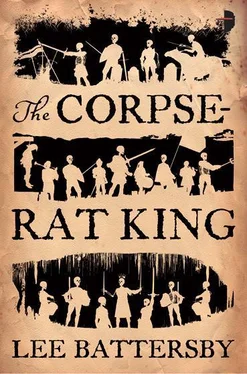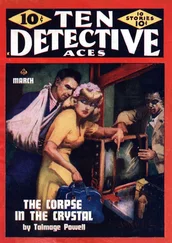Marius sighed. When some people talked, you could just hear the capitals. “No.”
“The body is a jar of clay, my friend, a vessel for the soul. The bird is a messenger from Heaven. He breaks the jar and sets the soul free. I shall walk through the Kingdom of the Dead as a transformed being. Higher, purer, more worthy of God. And I shall look for you, and hope to find you there.” He closed his eyes, and Marius realised why there was no expression on his face. He was at peace. Marius sighed again.
“I envy you your faith,” he said, and realised with a start that, just at this moment, he did. He looked up at the birdless sky. “But…”
“Yes?”
He glanced at Vun, then at his own nakedness., and shuddered. This, he thought, is about as low as I could possibly fall.
“If you’re waiting for the birds to release your soul,” he said carefully, “Surely those clothes you’re wearing are going to get in the way?”
TWENTY
Marius climbed down the final step and jumped onto the clearing floor. Above him, Vun peered over the edge and offered him a wave.
“Safe journey, my friend.”
“And you,” Marius waved back. “I hope the birds come soon.”
He turned his back on the tower and made his way towards the track. He’d learned a lot from Vun as they sat atop the tower. The track led down to a major roadway a mile to the west. Every three months or so, men from the village carried cured hides down to the road where they were met by a trader from Borgho, who paid them a small price for each hide they delivered. The trader took the hides back to Borgho, for what purpose, Vun could not say. He had been born in the village, and had never left. Village men rarely did, and those who left never came back. Marius was not surprised. Faced with a lifetime of rummaging around in the skins of dead animals, he wouldn’t turn his back on the fleshpots of Borgho either. But Vun was made of sterner stuff: he’d grown up at the tanning tables, and had died underneath one when a rotten leg had given away and crushed his back as he was reaching for a fallen rabbit pelt. If Vun’s timing was right, the Borghan trader would be along in a day or so to pick up the quarterly payload. Marius pulled at the seam of Vun’s simple cotton shirt. If he could find something to cover his face, if he could find some method of payment, if the trader agreed to give him space on the cart, he could avoid a long and tedious walk to the outskirts of Borgho.
If not… Marius gazed south, towards the rise that heralded the beginning of the Spinal Ranges If not, he would cut along the trade route that ran parallel to the range, swinging across the plains east of Borgho in a giant loop to eventually arrive at Scorby City. It would be a long journey, and it had already been almost a month since he had seen Tanspar dead on the battlefield at Jezel. Traditionally, the King lay in state for a full season, three months of the year, so that all his mourning citizens could file past in tribute. Then he was interred in the crypt of the great Bone Cathedral, beneath a single stone of more than a ton in weight, carved with scenes depicting his greatest triumphs. Liberating him from that would be a severe test of Marius’ skills to say the least. To say the most, it would be impossible. Far better to spirit him away whilst he lay in the open. All Marius would have to contend with under those circumstances were the thousands of loyal citizens shuffling through the viewing area each day, plus the tense and wary honour guard, and the citizens of Scorby, and the militia, not to mention dragging a heavy and rather recognisable corpse across who knew how many miles of open countryside before finding a way to bring him down to the land of the dead.
He quickly changed the subject. Things were not quite that bleak. He knew how to contact the dead – his conversations with Nandus and Vun had shown him that – and any motion was better than none. And right now, motion meant getting his dead backside to the main road to intercept the trader. He increased his pace. Do the job in front of you – another of his father’s aphorisms, but one that held water in his present circumstance.
He arrived at the track within a few minutes, and turned down it, away from the village. A passer-by would not have noticed anything more than the tiniest gap in the undergrowth. It was only used to bring the revered dead down to their resting place, and four times a year by those carrying hides to the road. Any path the villagers beat through the branches quickly became overgrown again. Nature plays a longer waiting game than man. But Marius had spent half his life hiding from one person or another, and his experienced eye picked out the multitude of tiny clearances and footfalls that denoted the correct passage. He stole forward, senses alert for the first sign of approaching villagers. Having to explain his presence, not to mention his choice of clothing, was not something he relished. He made the road in short order, and waited, crouched behind a bush that offered a ready hiding place with a good view of both the roadway and the track.
For the rest of the day, he was alone with his thoughts. The sun reached its apex, paused to survey its domain, and beat a hasty retreat towards evening. Marius shrunk back into the undergrowth in time with the shadows, reaching a level of stillness uninterrupted by the insects that came out to feast upon him and the little lizards that came to feed upon them. The world hung still within the universe. Then, some time towards the latter part of the day, voices came to him from down the track. Marius hunkered down, laying on his side and peering through two fronds. Several villagers approached, carrying a long, low-slung stretcher between them. A heap of hides sat upon it. Marius counted thirty, and was even able to identify some of them as rabbits and martens, as well as one large one that must have belonged to some unwary traveller’s horse. He watched as the villagers laid the pelts in a tidy pile by the junction of the track and road. Then they left, bar one, a tall, gangly youth with a skinning knife strapped to his hip, who settled his back against them and stared down the track past Marius’ hiding place, his arms folded behind his head.
Less than an hour later, a cart bumped and rumbled its way down the track to stop in front of the young villager. A burly man in a travel-worn cloak jumped down from the driving bench and offered his hand in greeting. The young man took it, and began to show the newcomer his wares. Marius listened as they haggled, shaking his head at the way the young villager allowed himself to be conned out of a fair price. Nobody came back to villages like this, he remembered, which meant nobody passed on knowledge of big city practices, and big city prices. Generation after generation of rubes, dying young in conditions only slightly better than subsistence farming. By the time the two men had finished, and shaken hands on the deal, the villagers had given away eighty percent of the price the un-worked hides would fetch in the markets of Borgho. Somebody should show them how to cut and sew, Marius thought. Surely, even this far from civilisation, people must understand that finished articles fetch a higher price than raw stock. Somebody should show them how to negotiate. Somebody should give them all a clip across the ear-hole. For half a second, he was ready to jump to his feet and intrude, and show the young fool how to deal with a merchant. Then he caught sight of the loose grey flesh on the back of his hands, and stilled the impulse. The merchant rounded his cart and pulled three hessian sacks from the back, presenting them to the youth. Vegetables, undoubtedly bartered from villages further down the merchant’s route. He placed them at the youth’s feet, and clapped him on the shoulder.
Читать дальше












